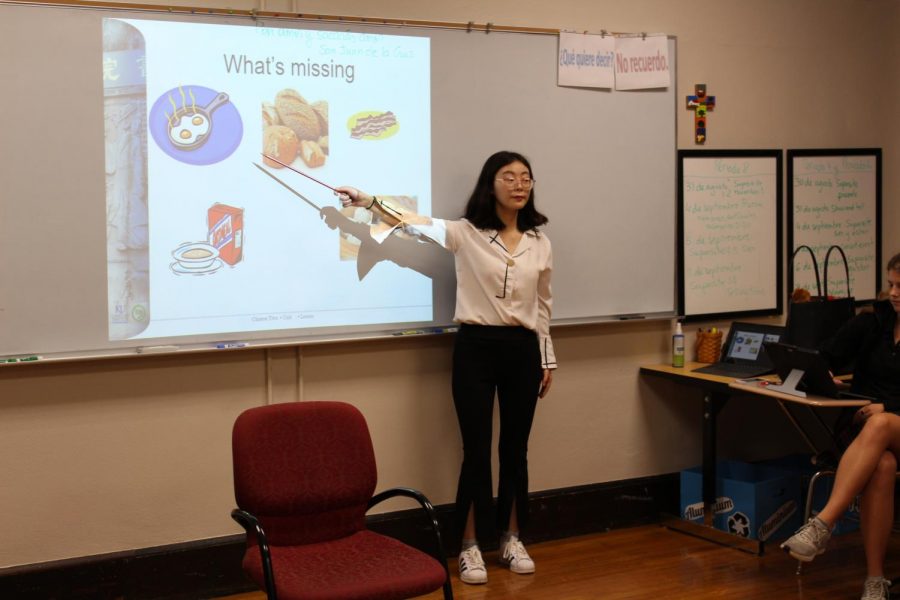STA Chinese: from online to in-person
This year, STA will host an intern, Libby Bai, to teach the Chinese classes, making the switch from a video conference class, to an in-person one.
Mandarin teacher Libby Bai teaches her class Aug. 3. This is STA’s first year with a face to face Mandarin teacher. photo by Grace Fiorella
September 15, 2018
Freshman Anna Albritton walks into D306 for the first day of Chinese class at St. Teresa’s Academy, 2017. Instead of a teacher walking in and introducing herself, one appears on the projector sparking simultaneous interest and curiosity. Ice breakers were a little harder than usual, seeing as the teacher in Lawrence, Kansas could neither hear students nor see a portion of them. Although this small class adjusted, this confusion remained a common theme throughout the year, and for some was hard to overcome.
“It was pretty difficult to communicate with her because… sometimes I couldn’t just show her a piece of paper that I had a question on,” Albritton said.
For the 2018-2019 school year, STA switched from Interactive Distance Learning, or IDL, to an in-person teacher, an intern named Libby Bai from the He Nan province in China. STA works with the Confucius Institute and Kansas University to foster the Chinese program, and for the past three years has done classes through long-distance video conference.
“KU asked if we would want to pilot [having an intern] because they haven’t had schools necessarily try it,” principal of academic affairs Barbara McCormick said.
STA will be the trial run for this experiment, and its success will be evaluated at the end of the year. Although having an intern places a burden on STA by having to provide housing and transportation, McCormick feels it is worth the extra work to have a Chinese teacher in house.
“It’s students, I believe, that feel more connected to a human person,” McCormick said on the benefits of a local teacher. “As much as you want to be connected to the teacher on your screen, having someone in class every day, that’s a presence, that can slow things down, that can really see you and you see them. That availability was the biggest component, and just having a physical presence.”
This benefit of availability has already been noticed by Albritton, who is now a sophomore and a student in Bai’s Chinese two class.
“As soon as I don’t get something, it’s not very hard to just ask her a quick question about it or talk to her after class,” Albritton said.
However, there will be some things she will miss.
“Sometimes I would miss always saying things multiple times [in the IDL class] before she would stop, because now the teacher would write it on the board and move away from it,” Albritton said.
Despite some of the glitches, Bai can see and continue to build upon the foundation that the students have built with previous teachers.
“The students I’ve taught here have a great background,” Bai said, “It’s better for me to teach them, it’s easier.”
Bai has taught English and calligraphy in China before coming to the U.S. Now, she teaches Chinese one, two and four. She finds learning different languages to be very beneficial for students.
“I think it’s another kind of thinking style,” Bai said. “Different languages, they represent different kinds of thinking styles and they represent different kinds of lifestyles and cultures. It’s not just language, but the culture behind it. The advantages of learning Chinese… I think we can have a different perspective.”
To each of her separate classes, Bai brings a different focus.
“All the parts of Chinese– the listening, the reading, the speaking and writing– are all important,” Bai said, “But… the freshmen focus more on speaking and listening. When you are a kid you cannot read, but you can speak, you can listen. For the sophomores and seniors, I think writing and reading are also important.”
STA is undoubtedly different from most schools in many aspects, but Bai sees this as an advantage.
“I think it’s a great place to teach in because it’s a private Catholic high school and I am more into teaching girls,” Bai said. “The classroom is harder to manage [with coed education]. But I think that only girls, only boys, or coeducation have their own advantages and disadvantages.”
McCormick sees the benefits of this program from a different perspective, that of STA’s mission and connection with the Sisters of St. Joseph of Carondelet. She sees both STA and Bai as benefitting from the arrangement.
“No matter what language or courses [STA students] take, I think it just opens their minds and hearts to other worlds and directions and pathways,” McCormick said. “This is just one way St. Teresa’s Academy is serving the dear neighbor, at the same time getting something in return.”
Thorough research was done before STA settled on Chinese rather than Japanese as another language offering for students.
“We considered Japanese because we have a sister school in Japan,” McCormick said. “I believe when we did the research and started looking at why Chinese would be the next language to offer, it would be something our girls could utilize in international communications, business, finance.”
Bai and McCormick agree on the long-term job benefits of learning Chinese as supposed to other languages.
“China is an industrial country that’s really coming up in the information age,” McCormick said, “More and more companies and connections are being made globally and Mandarin Chinese is a very popular language when you talk about the business industry.”
This year, Albritton’s first day of Chinese class went a little differently. She and her classmates walked in, introduced themselves to Bai, and spent 10 minutes learning to pronounce her name by telling it to their pencils, their desks, the floor, and anything else that could benefit from learning Bai Lao Shi’s name.
“I was kind of stressed out about [another year of Chinese class],” Albritton said. But she was pleasantly surprised with the first week of class.
“It was really easy just being with her,” Albritton said. “There’s no technology barriers. If we can’t get the internet to log on, that’s ok. It’s not going to stop class. I wasn’t really looking forward to it, but now that it’s started I love it.”









